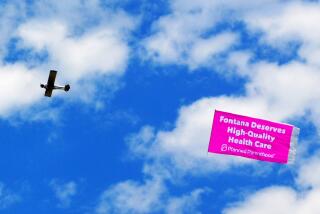Abortion Limit Could Affect Youths Most
- Share via
Planned Parenthood officials in the San Fernando Valley said the greatest impact of Monday’s Supreme Court ruling giving states new powers to limit abortion may be on teen-agers, who make up about 50% of their clientele.
The court upheld a Pennsylvania law that requires unmarried girls under 18 who are not supporting themselves to obtain the consent of a parent or a state judge. It also requires all women seeking an abortion to wait 24 hours after visiting a clinic before having the abortion, and submit to counseling about alternatives.
Ann Allard, manager of the Planned Parenthood Center in Sherman Oaks, said that about half of the 1,200 to 1,300 women who visit her clinic each month are under the age of 18, and that most choose not to involve their parents in the decision to get an abortion.
If a parental-consent law similar to the statute ruled upon by the Supreme Court were adopted in California, Allard said, many teen-agers would delay getting abortion counseling until late in their pregnancies out of fear of confronting their parents. That could put girls’ health at risk, she said.
“Lots of people don’t realize what this decision means to them,” Allard said.
California traditionally has had a liberal policy on abortion, but activists on both sides of the issue said Monday’s decision casts a cloud over the future course of abortion law. The court fell just one vote short of overturning the landmark 1973 Roe vs. Wade ruling that legalized abortion nationwide.
Al Wertz, director of the San Fernando Valley chapter of Operation Rescue, a group that has led antiabortion rallies throughout the country, said he supports the Supreme Court’s ruling on consent because it will ensure that parents are involved in a decision that many teen-agers are not mature enough to make alone.
He acknowledged, however, that a parental-consent law could complicate matters for pregnant teen-agers.
“I’m sorry if it puts them in a difficult position, but maybe they should have thought of that before they engaged in sexual behavior,” he said.
Abortion-rights advocates and antiabortion activists in the Valley said the ruling has renewed interest in the abortion debate and prompted increased activism on both sides.
Representatives of both sides said they have been getting dozens of phone calls from people seeking information on the ruling and how it will affect them. Many are volunteering to take active roles in the campaigns.
Rebecca Wickliff, president of the San Fernando Valley chapter of the National Organization for Women, said her group is angry over the ruling and plans to take measures to defeat antiabortion politicians in the Valley.
“There is a lot of anger, a lot of frustration and a lot of people can’t believe it has happened,” she said of the ruling.
Wickliff said the ruling should be of particular concern to the Valley’s white, middle-class women who think an abortion ruling by the Supreme Court will mostly affect poor or minority women in the inner city who must rely on federally funded clinics for abortion services.
“Women in the Valley should feel threatened,” she said. “They are not any more safe than anyone else.”
Seeing the threat to Roe vs. Wade, Democrats in Congress have already proposed legislation that would guarantee, as a matter of federal law, a woman’s right to abortion.
Rep. Anthony C. Beilenson (D-Los Angeles), who authored legislation in 1967 that liberalized abortion law in the state, issued a statement Monday condemning the ruling.
“It is extremely discouraging that the Supreme Court has today reversed more than 20 years of progress in the effort to guarantee all women the right to choose, and to keep courts and legislators out of citizens’ most personal and private decisions,” he said.
* MAIN STORY: A1
More to Read
Sign up for Essential California
The most important California stories and recommendations in your inbox every morning.
You may occasionally receive promotional content from the Los Angeles Times.














